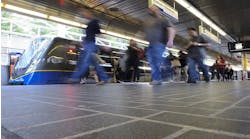Longtime BART spokesman Linton Johnson, who came under fire this summer for his response to protests over a fatal police shooting, was removed from his post Monday as part of a communications shakeup at the agency.
Johnson returned to work this week after an extended leave that began Aug. 22 when his grandmother became ill. However, he has been reassigned by new General Manager Grace Crunican out of BART's media and public affairs office, said Bob Franklin, president of the agency's board of directors.
BART said Johnson would help "develop and implement large-scale communications strategies for major district programs."
Franklin said that the move was not punitive and that Johnson would be paid his current salary. Franklin said the BART police force also plans to hire a full-time spokesperson for the first time as part of the reorganization.
Franklin said Johnson had "modernized the communications department" during his tenure as chief spokesman, which began in 2004. But he had also been under tremendous pressure, expected to answer calls from the media 24 hours a day and seven days a week, Franklin said. Johnson declined to comment.
BART said Jim Allison and Luna Salaver would split spokesperson duties.
Johnson, a former television reporter, was the public face of BART through a difficult period that included labor battles and the New Year's Day 2009 killing of unarmed train rider Oscar Grant by then-BART Officer Johannes Mehserle in Oakland. Mehserle was convicted of involuntary manslaughter.
Johnson's problems this summer began with another fatal police shooting, that of Charles Blair Hill at a station in San Francisco on July 3. BART said Hill, 45, had been shot while winding up to throw a knife.
Johnson sent an e-mail to BART colleagues hours before a planned protest Aug. 11 in which he outlined a strategy to win over public opinion by showcasing "loyal riders" who would be carried to a news conference in rented SUVs. Only one rider contacted by BART actually appeared at the conference.
BART cut off wireless service in its downtown San Francisco stations that same evening to prevent protesters from coordinating their movements, an action that had critics comparing the agency to a Third World dictatorship. Johnson said the idea had been his.
Johnson also drew fire for declaring that riders' free-speech rights end at the fare gates.
After the ploy to recruit "loyal riders" was revealed in September, Franklin said Johnson had begun "taking some of this personally. He made a series of errors in a limited amount of time."
Copyright 2008 LexisNexis, a division of Reed Elsevier Inc. All rights reserved.
Terms and Conditions | Privacy Policy


